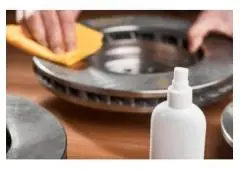Preserving Metal Integrity: The Role of Rust Inhibitors
Description
Rust inhibitors, also known as corrosion inhibitors, are essential compounds used to protect metal surfaces from the damaging effects of corrosion. Corrosion occurs when metals react with oxygen and moisture in the environment, leading to the formation of rust or oxide layers on the metal surface. Rust inhibitors work by either forming a protective barrier over the metal surface or altering the chemical environment to inhibit the corrosion process. Let's explore the significance, mechanisms, and applications of rust inhibitors:
Significance of Rust Inhibitors:
Prevention of Corrosion: Rust inhibitors play a critical role in preventing corrosion and extending the lifespan of metal structures, equipment, and components. By inhibiting the formation of rust, these compounds help maintain the structural integrity and functionality of metal assets, reducing maintenance costs and downtime.
Protection in Harsh Environments: In environments prone to corrosion, such as coastal regions, industrial facilities, and marine applications, rust inhibitors provide an additional layer of protection against corrosion-related damage. They safeguard metal surfaces exposed to moisture, saltwater, chemicals, and atmospheric pollutants.
Enhanced Aesthetic Appeal: Rust inhibitors help preserve the aesthetic appearance of metal surfaces by preventing the formation of unsightly rust stains, discoloration, and pitting. This is particularly important for architectural structures, automotive components, and decorative metalwork.
Mechanisms of Rust Inhibition:
Barrier Protection: Some rust inhibitors form a physical or chemical barrier over the metal surface, preventing moisture, oxygen, and corrosive agents from coming into contact with the metal. This barrier inhibits the electrochemical reactions responsible for corrosion and rust formation.
Passivation: Certain rust inhibitors promote the formation of a passive oxide layer on the metal surface, which acts as a protective barrier against further corrosion. This passive layer reduces the metal's reactivity and susceptibility to corrosion in aggressive environments.
Chemical Inhibition: Rust inhibitors may contain chemical compounds that react with metal ions or corrosive species in the environment, neutralizing their corrosive effects and inhibiting the corrosion process. These compounds may adsorb onto the metal surface, forming a protective film that impedes corrosion.
Applications of Rust Inhibitors:
Metal Coatings: Rust inhibitors are often incorporated into metal coatings, paints, and primers to provide corrosion protection for structural steel, automotive parts, machinery, and consumer products. These coatings form a durable protective barrier over the metal surface, safeguarding it from corrosion.
Metalworking Fluids: Rust inhibitors are essential additives in metalworking fluids, such as cutting oils, lubricants, and coolants, used in machining, milling, and metal fabrication processes. These additives protect cutting tools, workpieces, and machine components from corrosion during machining operations.
Storage and Packaging: Rust inhibitors are utilized in the storage and packaging of metal products, components, and equipment to prevent corrosion during transit and storage. They may be incorporated into packaging materials, desiccants, or vapor-phase corrosion inhibitors to maintain a corrosion-free environment.
Industrial Cleaning: Rust inhibitors are employed in industrial cleaning formulations, degreasers, and rust removal products to dissolve rust, inhibit further corrosion, and protect metal surfaces. These products are used for maintenance, restoration, and surface preparation in various industries.
Conclusion:
In conclusion, rust inhibitors play a vital role in preserving the integrity and longevity of metal assets by preventing corrosion and rust formation. Whether in metal coatings, metalworking fluids, storage applications, or industrial cleaning products, these compounds provide essential protection against the corrosive effects of moisture, oxygen, and environmental contaminants. By incorporating rust inhibitors into corrosion prevention strategies, industries can prolong the lifespan of metal structures, equipment, and components, ensuring reliability, safety, and cost-effectiveness in diverse applications.
Cutting oil additive rust inhibitor, Rust inhibitor additive for metalworking fluids, Rust inhibitor additive for cutting oils, Rust inhibitor additive for water-soluble cutting oils, Water-soluble cutting oil additive rust inhibitor






Useful information
- Avoid scams by acting locally or paying with PayPal
- Never pay with Western Union, Moneygram or other anonymous payment services
- Don't buy or sell outside of your country. Don't accept cashier cheques from outside your country
- This site is never involved in any transaction, and does not handle payments, shipping, guarantee transactions, provide escrow services, or offer "buyer protection" or "seller certification"






